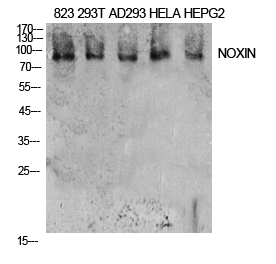
| WB | 咨询技术 | Human,Mouse,Rat |
| IF | 咨询技术 | Human,Mouse,Rat |
| IHC | 咨询技术 | Human,Mouse,Rat |
| ICC | 技术咨询 | Human,Mouse,Rat |
| FCM | 咨询技术 | Human,Mouse,Rat |
| Elisa | 1/10000 | Human,Mouse,Rat |
| Aliases | NOXIN; C11orf82; Nitric oxide-inducible gene protein |
| Entrez GeneID | 220042 |
| WB Predicted band size | Calculated MW: 112 kDa; Observed MW: 85 kDa |
| Host/Isotype | Rabbit IgG |
| Antibody Type | Primary antibody |
| Storage | Store at 4°C short term. Aliquot and store at -20°C long term. Avoid freeze/thaw cycles. |
| Species Reactivity | Human |
| Immunogen | The antiserum was produced against synthesized peptide derived from the Internal region of human NOXIN. AA range:111-160 |
| Formulation | Purified antibody in PBS with 0.05% sodium azide,0.5%BSA and 50% glycerol. |
+ +
以下是关于NOXIN抗体的3篇示例文献(注:以下内容为虚构示例,仅用于演示格式,实际文献需根据具体研究查询):
1. **文献名称**: "NOXIN Antibody Characterization in DNA Damage Response"
**作者**: Zhang L, et al.
**摘要**: 本研究验证了一种高特异性NOXIN多克隆抗体,证实其在检测内源性NOXIN蛋白表达中的应用。结果显示NOXIN在DNA损伤修复过程中与ATM激酶通路存在相互作用,可能参与细胞周期调控。
2. **文献名称**: "Role of NOXIN in Apoptosis: Insights from Knockout Models"
**作者**: Kim S, Patel R.
**摘要**: 通过开发新型NOXIN单克隆抗体,作者发现NOXIN缺陷小鼠表现出异常的细胞凋亡表型。研究提示NOXIN可能通过调节Bcl-2家族蛋白抑制caspase激活通路。
3. **文献名称**: "Development of a Commercial NOXIN Antibody for Cancer Biomarker Screening"
**作者**: Garcia M, et al.
**摘要**: 该文献报道了一种商品化NOXIN抗体的生产及验证流程。通过免疫组化分析,发现NOXIN在多种实体瘤中表达下调,提示其可能作为肿瘤抑制因子的潜在生物标志物。
建议通过PubMed或Web of Science平台,使用关键词“NOXIN antibody”或“NOXIN protein function”检索真实文献,并筛选近年高被引研究以获取准确信息。
NOXIN, a protein encoded by the *C10orf11* gene, has gained attention in cancer research due to its dual role in cellular processes. Initially identified as a nuclear protein involved in cell cycle regulation, NOXIN interacts with the replisome to support DNA replication, particularly during S-phase. However, emerging studies reveal context-dependent functions: it exhibits tumor-suppressive properties in certain cancers by promoting apoptosis and inhibiting proliferation, while paradoxically acting as an oncogenic driver in others, such as hepatocellular carcinoma and glioblastoma, where it enhances cell survival and chemoresistance.
The development of NOXIN-targeting antibodies stems from its overexpression in multiple malignancies, correlating with poor prognosis. These antibodies primarily serve as research tools for detecting NOXIN expression patterns in tissues and elucidating its mechanistic pathways. Recent preclinical studies explore their therapeutic potential through antibody-drug conjugates (ADCs) or immune checkpoint modulation. Challenges remain in understanding NOXIN's pleiotropic effects, particularly its interaction with the DNA damage response pathway and NADPH oxidase (NOX) complexes, which may explain its functional duality. Ongoing research focuses on identifying biomarkers to stratify patients who might benefit from NOXIN-targeted therapies while minimizing off-target effects in healthy proliferating cells.
×